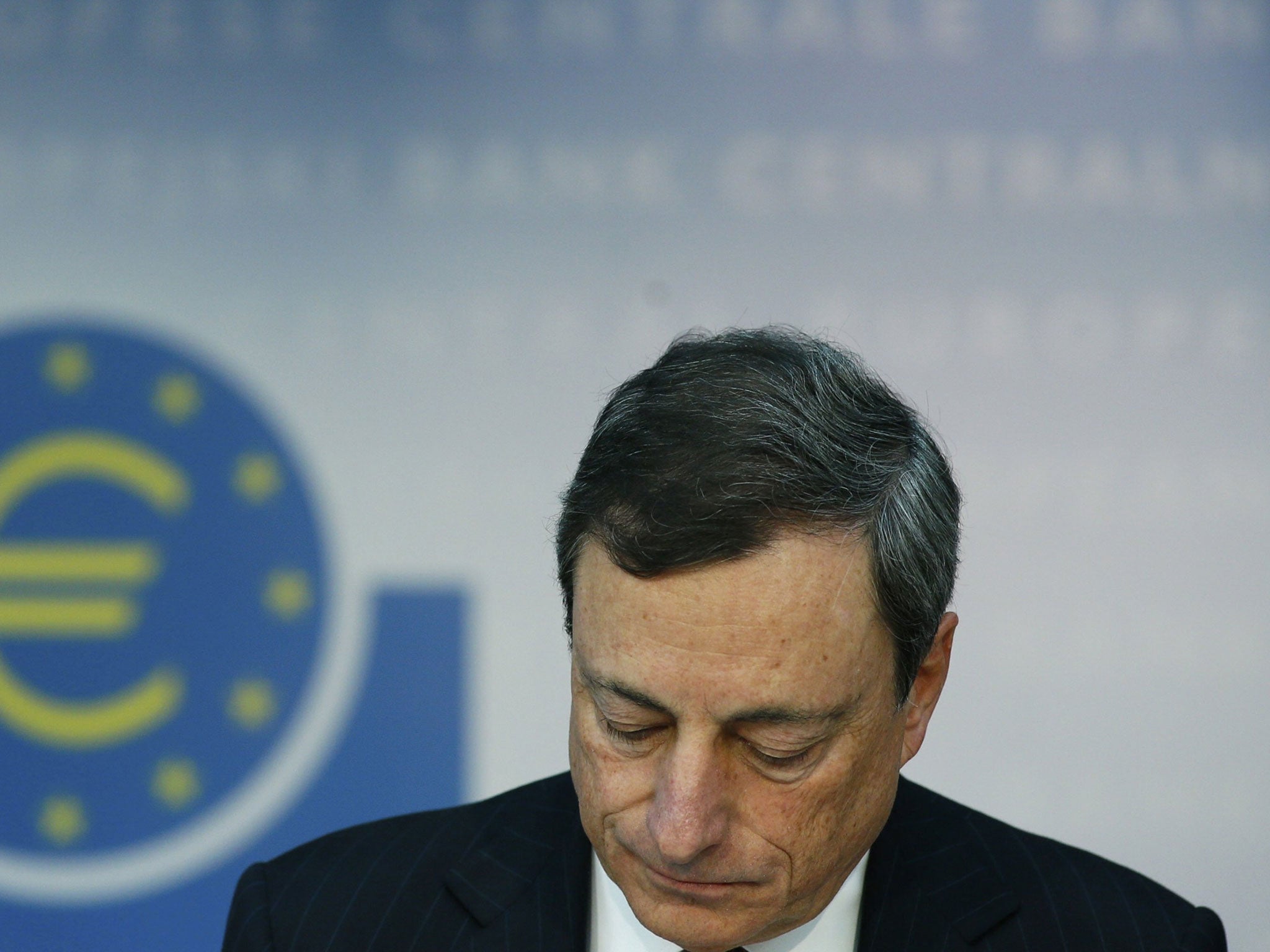ECB meeting: All eyes on Mario Draghi as eurozone moves closer to recession
Five things you need to know ahead of tomorrow's European Central Bank meeting

Investors can expect strong words Thursday from the European Central Bank.
President Mario Draghi will likely speak forcefully about the bank's willingness to launch more stimulus to support the struggling economy.
Strong action, however, will likely wait until the first months of next year, analysts say.
More stimulus could include large-scale purchases of government bonds, a step which involves pushing newly created money into the economy to raise growth and inflation. It's a tool the U.S. Federal Reserve, Bank of England and Bank of Japan have all used.
The ECB's goal: raise the inflation rate, which at 0.3 percent annually is way below the official goal of just under 2 percent and is a sign of economic weakness.
Here are five things to know ahead of Thursday's meeting of the bank's 24-member governing council, to be followed by Draghi's news conference.
NOT JUST YET
It might take several months before the ECB launches a big program of government bond-buying.
Draghi has been emphatic that the ECB will do what it must to raise inflation "as fast as possible. " Vice president Vitor Constancio indicated a decision on providing more stimulus, if needed, would be made during the first three months of next year. The ECB is already buying bonds made of bundled bank loans in an effort to improve credit to companies so they can expand and hire.
On Thursday, "even if it does not step up its actions just yet, it will choose language for the statement that makes additional easing a near certainty" in the first quarter, said economist Christian Schulz at Berenberg Bank.
There's a chance the bank might broaden its existing purchases of bundled bank loans to include other types of investments.
In pictures: Chancellor George Osborne delivers his Autumn Statement
Show all 8THE OIL FACTOR
The impact of plunging oil prices plays a role in the ECB's future actions.
In the short run, lower oil prices mean lower inflation. That would — in theory — make it more likely for the ECB to act.
Yet lower oil prices are also a form of stimulus. With lower fuel and heating bills, consumers will have more money to spend in shops. German motorists have seen prices fall for Super E10 fuel to 1.42 euros per liter ($6.69 per gallon) from 1.53 euros per liter ($7.16 per gallon) in September.
THE EURO
The euro's recent drop is a major consideration for the ECB.
Although the ECB does not officially target a value for the shared currency, analysts say it would welcome an even weaker euro. Stimulus can lower a currency's exchange rate.
A lower euro would help eurozone exporters by making their goods more competitive internationally. It would also nudge up inflation by making imports more expensive. The ECB would welcome both effects.
The shared currency is now at $1.23 against the U.S. dollar, down from just under $1.40 in May, largely due to traders' anticipation of ECB action.
NOT ON BOARD — YET
One reason the ECB has held off on mass bond purchases is skepticism about whether they'll work — in particular, from German officials.
They think such purchases would bail out feckless governments that haven't reformed their economies by driving down their borrowing costs. They also say bond purchases could stick German taxpayers with losses in case of a sovereign default.
Sabine Lautenschlaeger, a German member of the ECB's six-member executive board that runs the bank day to day, said Saturday that a look at the merits of government bond-buying "does not give a positive outcome at the present time."
She noted European companies get credit from banks, not from the bond market as is more often the case in the United States. That means intervening in the bond market is a less effective tool for providing companies with cheaper credit. She also noted that government bond yields are already very low, meaning there's less room to drive them down.
The ECB is supposed to be independent of national politics — but German concerns still seem to matter. The country is the biggest and most politically influential member of the currency union.
THE DRAWING BOARD
ECB staff are likely to lower their projections for inflation for next year from 1.1 percent annually to well below 1 percent. That estimate is worth watching because the ECB's legal mandate is to pursue stable prices.
So falling projections from the ECB's own staff would be a clear justification for taking more action to raise inflation.
PA
Subscribe to Independent Premium to bookmark this article
Want to bookmark your favourite articles and stories to read or reference later? Start your Independent Premium subscription today.

Join our commenting forum
Join thought-provoking conversations, follow other Independent readers and see their replies